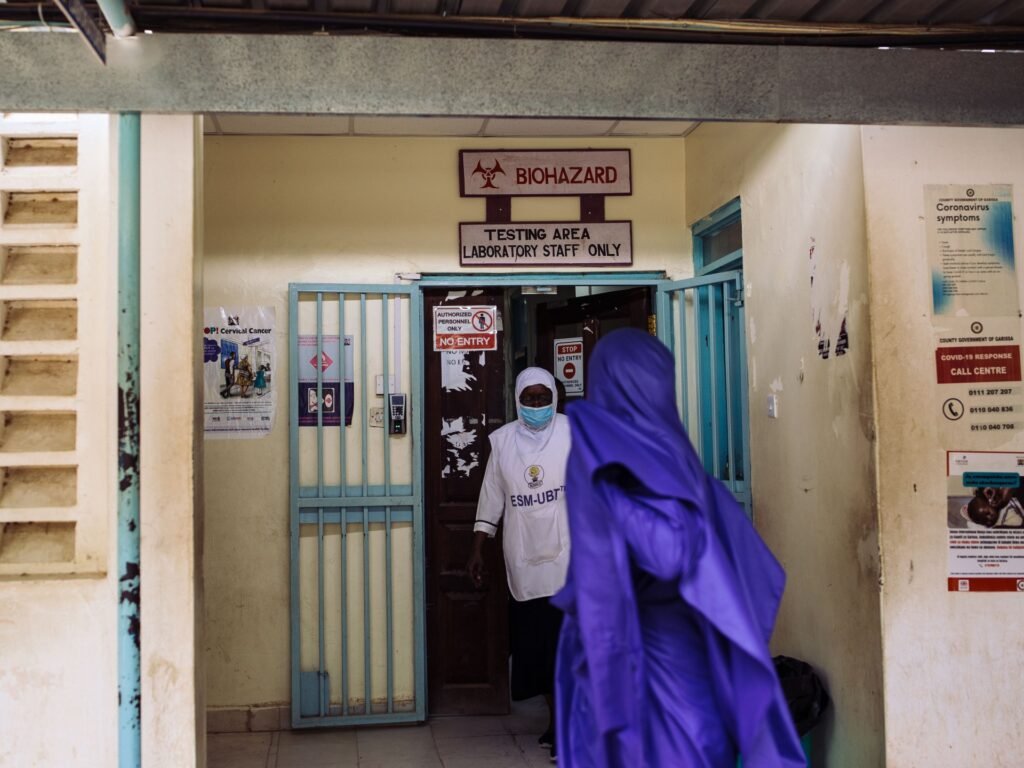Garissa, Kenya – In January 2020, one of many greatest locust plagues to hit the Horn of Africa in 70 years landed in Garissa, a distant city in northeastern Kenya close to the Somali border. The area is honeycombed with small-scale croplands rising largely maize and an array of produce – tomatoes, watermelons, bananas, lemons – belonging to farmers corresponding to Mohammed Adan.
As hundreds of thousands of locusts descended, devouring all residing flora in sight, Adan and his fellow farmers had been horrified. This area is not any stranger to locusts––the United Nations Meals and Agriculture Group (FAO) even has a delegated Desert Locust Management Committee (DLCC) to mitigate periodic injury from locusts. Nonetheless, mayhem ensued in the course of the plague.
The FAO spearheaded a “Desert Locust” marketing campaign with a funds of greater than $230m, in partnership with the World Financial institution and World Meals Programme. Collectively, they aided Kenya’s Ministry of Agriculture in spraying a cocktail of pesticides throughout 100,000 hectares (250,000 acres) of land, residence to 26,650 households.
Adan, liable for a household of 11, was relieved to obtain such assist, as had been his neighbours. After a rushed, impromptu workshop hosted by a authorities agricultural extension officer, the place they realized the way to combine the pesticides with water to fill knapsack sprayers, the farmers set off to avoid wasting what was left of their crops. However the farmers say they weren’t briefed on what sort of chemical compounds they got, nor supplied with any protecting gear.
Amidst the frenzy, Adan sloshed a number of the concoction throughout his torso. He didn’t suppose a lot of it on the time. It was hours earlier than he rinsed himself off with water, and weeks earlier than he began feeling actually sick with stomach ache, nausea, and an incapability to go urine. Thus started an extended journey of being shuttled out and in of hospitals. Now, three years later, he’s dealing with the potential for a sixth surgical procedure.
“It’s exhausting to calculate how a lot the damages got here to,” 28-year-old Abubakar Mohammed (Abu), one among Adan’s sons, tells Al Jazeera. “A number of it may possibly’t be [quantified].”
Bureaucratic aftermath
The Ministry of Agriculture has denied issuing pesticides to farmers; Ben Gachuri, a communications officer in Garissa instructed Al Jazeera by phone that it was “not possible that farmers may have been instructed to spray [pesticides] themselves” and that within the “three years for the reason that remaining spraying, nobody has ever come ahead with complaints about struggling results from the pesticides”.
FAO representatives declined to publicly launch reviews about documented person errors and actual pesticide make-up info, or their procurement process. The East Africa regional workplace emailed a press release downplaying FAO’s function in choosing merchandise – authorised or not. Additionally they denied the likelihood that untrained neighborhood members had been concerned, insisting that solely “well-trained/correctly geared up groups undertake controls, not communities or farmers”.
In March 2023, the DLCC hosted a gathering in Nairobi to tout its success in salvaging northern Kenya’s meals safety. The assembly, based on Christian Pantenius, a former FAO workers member who attended, failed to handle a number of errors internally admitted by the FAO as a part of their 2020 spraying marketing campaign in Kenya and Ethiopia.
“I used to be so, so upset,” Pantenius, who labored as an impartial marketing consultant coordinating the marketing campaign, instructed Al Jazeera. “It was an enormous missed alternative.”

Of the 193,600 litres (51,000 gallons) of pesticides the FAO procured for the Kenyan authorities, 155,600 litres had been organophosphates corresponding to fenitrothion and chlorpyrifos. These chemical compounds have been banned to be used on meals or feed crops throughout most Western nations for his or her confirmed neurological toxicity to people and ecological devastation.
Nonetheless, the FAO procured and distributed them to untrained neighborhood members in opposition to the recommendation of its personal impartial advisory physique, the Locust Pesticide Referee Group (LPRG).
In a 2021 report, the LPRG expressed uneasiness about FAO’s selection of outdated chemical compounds: “In view of accelerating considerations about using artificial pesticides and the absence of recent merchandise evaluated for locust management, emphasis must be given to the least poisonous compounds already evaluated in relation to human well being and environmental influence.”
“If nations determine to make use of pesticides that aren’t supported by the FAO, corresponding to carbofuran, they’re inside their rights. The FAO will simply not use them in campaigns it runs itself,” stated James Everts, an ecotoxicologist with the LPRG, in an e mail interview with Al Jazeera. “A compound like fipronil – banned within the UK, permitted within the US, Australia, Belgium, and the Netherlands – is extraordinarily efficient in opposition to locusts. Nonetheless, large-scale, long-term observations have proven that there’s a long-term menace to ecological key organisms.”
The FAO’s East Africa workplace dismissed these considerations from its personal advisory physique and has insisted all pesticides had been procured by means of official channels and are technically authorized, based on Kenya’s Pesticide Management Board itemizing.
An inside report dated September 2020 that Al Jazeera obtained from sources on the Ministry of Agriculture confirmed that the FAO didn’t conduct required environmental and social influence assessments as per Kenya’s environmental legal guidelines. The report condemned the shortage of communication with communities on the bottom concerning when the pesticides had been sprayed.
In northern Kenya’s Samburu County, fenitrothion – banned in New Zealand in 2016 – was discovered for use by “non-trained personnel” wielding motorised and knapsack sprayers. The speed of software was additionally dangerously excessive: 34 litres per hectare, way over the really helpful price of 1 litre per hectare. Spraying had additionally been carried out on a wet day, spiking dangers of chemical run-off. Excessive honeybee mortality was noticed shortly afterwards.

‘Extra strain’
All this has occurred, consultants say, regardless of the supply of a extra environmentally pleasant various, Metarhizium acridum, also referred to as Novacrid.
Novacrid trials had been carried out in northern Kenya’s Turkana and Marsabit counties in 2020 to nice success: an estimated 90 % of locusts had been eradicated from the take a look at trials. The LPRG described this biopesticide because the “most applicable management possibility … regardless of its larger value”.
But it’s unlikely that Novacrid will ever be adopted and used on a big scale. “Biopesticides in locust management don’t serve financial pursuits,” explains Pantenius. “That’s why there’s little interest in significantly utilizing biopesticides for pest management. It’s a matter of political will.”
Since biopesticides like Novacrid – designed to focus on desert locusts – can’t be used for different pest management, not like their extra noxious organophosphate counterparts, the pesticide trade can not depend on them, he explains. “Locusts come and go. That’s the most important impediment in introducing this technique.”
Native governments really feel equally, Pantenius continues, however establishments such because the FAO must be advocating for stricter accountability, he stated.
“We [the FAO] must be speaking to governments that we need to assist them, however that we are able to’t provide them with poisonous chemical compounds,” he says. “It’s additionally vital for donor nations, the EU, World Financial institution, USAID to place extra strain on [governments] subsequent time.”
Paul Gacheru, a programme supervisor at Nature Kenya – East Africa’s oldest pure historical past society – is sympathetic to the advanced tradeoffs governments and establishments alike face, particularly in instances of emergency. Nonetheless, he believes there must be a stronger sense of environmental integrity – particularly from world establishments such because the FAO.
“There’s a loophole accessible within the regulation,” Gacheru explains. “International or worldwide establishments would possibly benefit from less-developed nations with much less strict processes and insurance policies. It’s what you possibly can name the dumping of chemical compounds.” A European nation could have an insecticide that it has produced however is now banned and rendered out of date in its personal nation, he continues, however must promote it off.
However Adan merely desires to return to some semblance of a traditional life. He’s not even essentially looking for compensation from the federal government for his accidents. “It will be good to have the invoice prices lined,” he provides as an afterthought.
